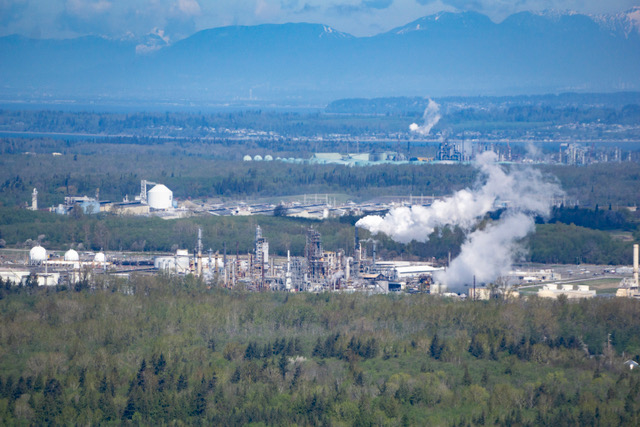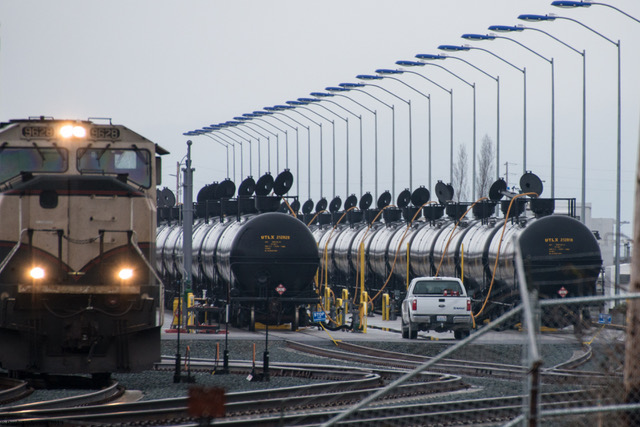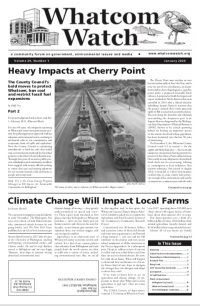by Eddy Ury
The County Council’s bold moves to protect Whatcom, ban coal and restrict fossil fuel expansions
Part 2
For more background and context, read Part 1: February 2019, Whatcom Watch.
For over 60 years, oil companies operating in Whatcom County have gotten major permits for polluting projects approved without adequate environmental review, resulting in substantial risks to our communities and ecosystems from oil spills and explosions. Now the County Council is considering amendments to land-use code that would raise environmental standards for fossil fuel projects in the Cherry Point industrial zone. Through four years of extensive public process, stakeholders and community members have engaged with county officials seeking to ensure that new and existing industries do not increase hazards, risks and harm to people and ecosystems.

Oil trains traveling through communities western Washington on their way to one of the four refineries in Whatcom and Skagit Counties photo: Paul K. Anderson.
The Cherry Point zone overlays an area known traditionally as Xwe’chi’eXen, and is now the site of two oil refineries, an aluminum smelter, three shipping piers, a gas-fire power plant, a proposed renewable diesel refinery. A proposal to build the largest coal export terminal in North America there was cancelled in 2016 after a federal decision upholding Lummi Nation’s assertion that the project violated their treaty-protected rights to fish at usual and accustomed areas. The area along the shoreline and tidelands surrounding the deepwater port is an Aquatic Reserve designated by the Washington State Department of Natural Resources (DNR), known to be critical spawning habitat for herring, an important species in the marine food-web whose population has been decimated over the last 50 years of monitoring.
On December 3, the Whatcom County Council voted 5-2 to extend — for the eighth and likely final time — the six-month temporary moratorium barring permits for projects in the Cherry Point industrial zone that would increase shipments of unrefined fossil fuels not for processing, refining or consumption at local industries. This interim ordinance, first passed in August 2016, is intended as a short-term measure to allow time to create county rules protective enough of the environment and nearby communities, commensurate with the risks posed by high-impact industries. The council is expected to vote for adoption of zoning code amendments before the moratorium expires in May 2020.
The proposed “Cherry Point Amendments” would prohibit new fossil fuel refineries and transshipment facilities, and require more stringent permitting processes and environmental review for existing oil refineries. These amendments are moving through a public review process and are likely to be enacted into law this spring, though their final form is uncertain.
Proposed Code Amendments
In May 2017, the County Council passed Comprehensive Plan amendments for the Cherry Point zone and called for a legal study into the county’s policy options for limiting the negative impacts of unrefined fossil fuel shipment increases. The county hired Cascadia Law Group (CLG) to produce a report, which they presented in February 2018. The attorneys recommended that the best county regulatory tool for new projects at existing industries is to require conditional use permits (CUPs) with prescribed conditions.
The timeline for passing final code amendments has been a moving target. After a year of gradual attempts to draft a land-use ordinance, the council hired Cascadia Law Group to produce draft code amendments to accomplish the council’s stated policy goals. The preceding article in this story, of the February 2019 Whatcom Watch issue, described draft code amendments the County Council had moved to introduce on January 15, 2019. On January 29 (after the publication had gone to print, but before distribution, thus creating an inaccuracy), the council subsequently withdrew that motion unexpectedly and passed a resolution that called for a new draft ordinance to be prepared by Cascadia Law Group, stalling the process for several months.
In June 2019, Cascadia Law Group presented their draft code amendments, along with some slight edits to the Comprehensive Plan (a general policy document) to update for consistency. On August 7, the council formally introduced the draft amendments for public review by the Planning Commission, an appointed volunteer advisory board.
The council’s proposed code amendments would prohibit the construction of new fossil fuel refineries and fossil fuel transshipment facilities. New industrial piers and coal-fired power plants would also be banned, while renewable fuel refineries would be permitted conditionally. Expansions of existing oil refineries would also require conditional use permits and more stringent environmental review.
Last fall, the Planning Commission held six public meetings, a Town Hall and five work sessions, totaling over 21 hours of public meetings. Their work to revise the draft will continue until they deem their recommended draft amendments complete. Another public hearing will take place before the County Council conducts final review, then will introduce the ordinance for a final public hearing and vote.
Conditional Use Permits
Whereas a standard building permit which is approved by Planning & Development Services (PDS) staff, a conditional use permit (CUP) requires a public meeting with the county’s Hearing Examiner, who may receive comments from concerned parties before issuing a permit with stipulated conditions based on the rules of the county code and other municipal governing documents, like the comprehensive plan and shoreline management program (SMP). Unlike a standard building permit, a conditional use permit can be revoked if conditions are broken, though that rarely happens. Conditional use permits are appealable, like all permit decisions.
Under standard land-use rules, permits for construction of facilities of allowed “uses” in a zone are processed by county planning staff. In addition to applying for any required building permits, the proponent submits a State Environmental Policy Act (SEPA) application, describing the foreseeable environmental impacts of the project. The planning department then makes a “threshold determination” of the project as significant or non-significant under SEPA.
Projects with a “Determination of Significance” (DS) require an Environmental Impact Statement (EIS), with public hearings to take input on the scope of impacts to be studied, then to take input on the draft report (DEIS). When the Final Environmental Impact Statement (FEIS) is released, permits can be approved by authorities, with or without mitigation conditions, or rejected if the FEIS shows significant, unmitigable, adverse impacts. A permit decision can be appealed to the county Hearing Examiner, and then to Superior Court and beyond.
Key Policy Debates
Generally, parties advocating on all sides of this issue are in agreement about these fundamental premises: Whatcom County’s economy depends on the oil refineries and the fuels they produce. If the refineries ceased to operate while we still depend on petroleum fuels for vehicles, vessels and aircraft, then those fuels would still be shipped through the Salish Sea with the same risks and hazards that we currently endure. The refineries should be regulated and held to high standards for labor, safety, and pollution control.
There is disagreement about what the extent of appropriate regulation is, and whether current rules are adequate to safeguard public safety and our environment given the already high risks we bear from shipments of hazardous materials, the enormous air and water pollution from the operations at Cherry Point industries, and the continued decline and jeopardy of surrounding ecosystems.

Phillips 66 and BP refineries in the Cherry Point industrial zone, viewed from the south. photo: RE Sources
Notable in the public discourse of 2019, is there has been virtually no advocacy against the prohibitions on new industry. Opponents of the amendments have focused mainly on rules for existing refineries, claiming that the conditions and requirements would be overly burdensome and thus deter investment in upgrades and expansions.
British Petroleum (BP) lobbyists have argued that the moratorium violates the U.S. Constitution’s dormant Commerce Clause by “favoring in-state economic interests over out-of-state interests.” Brian Israel, at the law firm Arnold & Porter, argued in a December 3 public letter that the moratorium “facially discriminates against interstate commerce. The Moratorium bars companies in Cherry Point from constructing or expanding facilities that receive, transfer, or store crude oil, unless the oil will be processed or consumed within Whatcom County. That is, companies are free to construct or expand facilities as long as they use local refineries to process their fuel. The Moratorium thus disfavors companies that wish to transport crude oil through the county for processing elsewhere. And it has the practical effect of steering business toward local refineries, to the detriment of out-of-state competitors.”
BP’s advocates have been stating repeatedly for years that the moratorium and regulatory uncertainty around future policy “threaten jobs” by deterring investment in upgrades, even though the moratorium does not apply to any project related to refining, processing or consumption of fossil fuels. This oft-repeated claim, directly contradicted by BP’s own legal argument, is further contradicted by the reality of upgrade and expansion proposals permitted at Cherry Point in the last three years.
BP upgraded their diesel unit in 2017 to co-process tallow with petroleum. In 2018, BP replaced their coker, a massive production unit that required a temporary unloading dock to be constructed in the Cherry Point Aquatic Reserve in order to bring in the modules. In 2019, Phillips 66 installed a new power substation, purchased a land parcel for $3.5 million, and, through a subsidiary, applied for permits to construct an entirely new refinery to produce renewable diesel from biomass feedstocks.
The Planning Commission is still grappling with how to define what qualifies as an “expansion” and what to exempt. The current draft, with additions from planning staff following input from industry representatives, has an expanding list of 19 project categories for existing oil refineries that are outright permitted uses and exempted from a conditional use permit. Refinery spokespeople still contend that this is inadequate, and oppose conditional use permits being required for any project.
The criteria for conditions listed in the proposal are mostly ordinary measures that would already be necessary for a project to be completed. Disputed criteria include that the conditional use permit would limit a transshipment facility’s use for transferring only the types and volumes of materials disclosed to the county for specification in the permit. The proponent would also have to demonstrate that the proposal retains or adds living wage jobs.
The Planning Commission has stricken criteria that would require proof of insurance and greenhouse gas mitigation, after hours of discussion and presentations on the subjects. The industry was very outspoken against requirements to invest locally in mitigations that reduce greenhouse gases if their proposal would otherwise increase climate pollution.
They also opposed proof-of-insurance requirements that were intended to ensure that damages to the county and residents would be covered in disaster risk scenarios such as an oil train explosion. The idea was to ensure that if a project induced these risks, the proponent would have to demonstrate that some entity would cover damages, even if the refinery was not liable for the accident. Even with the insurance and climate mitigation provisions removed, the industries are still claiming that the conditional use permit is too burdensome.
Notably, the two oil refineries in Skagit County at March Point already have to obtain conditional use permits for constructions over 50 feet, as per the city of Anacortes land use code governing the March Point industrial zone. Shell Puget Sound Refinery had to obtain two conditional use permits in 2018 for crude oil and product storage tanks. Though the rule is arbitrary, the procedure requires a Hearing Examiner decision on the permit. There appears to be no push from March Point industries to overturn or make an exemption for this requirement.
Change of Use
The most significant area for the Planning Commission to address at their January 16 meeting will be Change of Use. A fundamental problem with the status quo for industrial permitting in Whatcom County is that once a permit is granted, a facility’s use can change without new review of the cumulative environmental impacts. A project can be presented for review with identifiable foreseeable impacts, then change its operations. When new permits are reviewed for upgrades to an existing facility, the county always determines the project non-significant.
For example, the wharf and pier currently owned by Petrogas was constructed in the mid-1960s in connection to the Intalco aluminum smelter, prior to the passage of major environmental laws and policies in the early 1970s, such as Washington’s State Environmental Policy Act (SEPA) and Shoreline Management Act (SMA).
In 1975, California Liquid Gas Corporation was permitted to construct and operate a liquefied petroleum gas (LPG) storage and transfer facility attached to the Intalco wharf. The upgrades and modifications to the terminal included piping and installation of a marine unloading arm for LPG. The purpose of the project was explicitly described to be for receiving and unloading gas for use in Whatcom County. No mention of loading gas for export was made in the project documents. Nonetheless, the LPG terminal began to be used for exporting propane and butane (LPGs) through the Intalco pier in the 1980s, according to comments from Petrogas to the Whatcom Planning Commission.
The pier, wharf and terminal are now owned by Petrogas, though it continues to be used by Alcoa Intalco Works for aluminum shipping. The Petrogas pier is restricted to shipping LPG and aluminum on up to 48 vessel calls per year by terms of a state aquatic lands lease. For the last five years, LPG export volumes have risen sharply, with LPG brought by rail from out-of-state through Whatcom County for export to Asia. This occurrence illustrates what is possible for one of the adjacent oil terminals, or for any additional constructions such as crude oil storage tanks unless the county amends its code. They can be permitted for a stated purpose, deemed non-significant, then re-purposed for exporting crude oil thus inducing new impacts from vessel traffic and rail shipments.
This loophole can be closed by amending code to require conditional use permits that specify the use of refinery facilities to support refining. A change of use for exporting crude oil without refining would violate the terms of permitting. A key provision that is still missing from the draft amendments is a criteria for conditional use permits to ensure this. County staff have identified that a better operating definition for Change of Use is needed, and the Planning Commission is considering how best to define it.
Political Landscape
The Whatcom Business Alliance (WBA), led by Tony Larson, was formed in 2012 as a pro-coal-terminal advocacy organization, and has since become a major public engagement force to fight regulations for fossil fuel industries. In 2016, they launched the campaign to “Preserve Cherry Point Jobs,” distributing thousands of yard signs and placing advertisements claiming that Whatcom County Council was seeking to “kill jobs and cut education funding,” implying that restrictions on industrial expansions would force oil companies out of business, thus resulting in reduced property tax revenue. In late 2019, the WBA rebranded their Cherry Point campaign as the “Whatcom Coalition for Economic Growth,” placing full-page advertisements in local newspapers opposing the proposed code amendments.
Whatcom Business Alliance President Tony Larson ran for County Executive in 2019 against Satpal Sidhu, a County Councilmember who had voted in favor of the temporary moratorium eight times. Despite outsized oil-funded PAC spending on attack ads last Fall, Satpal Sidhu prevailed with 51 percent of votes over WBA President Tony Larson. Had Larson defeated Sidhu, the Cherry Point amendments would be dead in the water.
Two new Councilmembers are to be seated on January 14, and both have been vocally opposed to Cherry Point amendments and moratoria. Though the final content for the amendments remains in flux, after four years of process, it is expected that amendments in some form will pass with a 4-3 council majority and be signed into law by Executive Sidhu.
Draft Amendments Weakened
Though it is clear the County Council intends to pass code amendments, thus concluding four years of temporary moratoria, the final outcome of content for the amendments remains uncertain. Industry stakeholders have been thoroughly engaged in the Planning Commission’s review process, providing several hours of presentations at the public meetings.
The council’s proposed amendments would have required proof of insurance for high risk-inducing projects, and mitigation for increased greenhouse gas emissions. The Planning Commission has recommended to remove those requirements for refinery expansions, as well as any new conditions for renewable fuel facilities.
The Planning Commission will continue to work on Cherry Point amendments at a work session on Thursday, January 16, 6:30 p.m. at the Whatcom County Council Chambers, 311 Grand Ave. It is unknown how many work sessions remain before there will be another public hearing, then review by the County Council for an undetermined length of time before introduction of the land-use ordinance, a final public hearing, and council vote.
To stay engaged and up-to-date, visit RE-Sources.org and join our e-newsletters. We’ll send you the best ways to get involved in passing these precedent-setting protections for environmental health and safety.
___________________________
Eddy Ury is the Clean Energy Program Manager at RE Sources for Sustainable Communities in Bellingham.






























